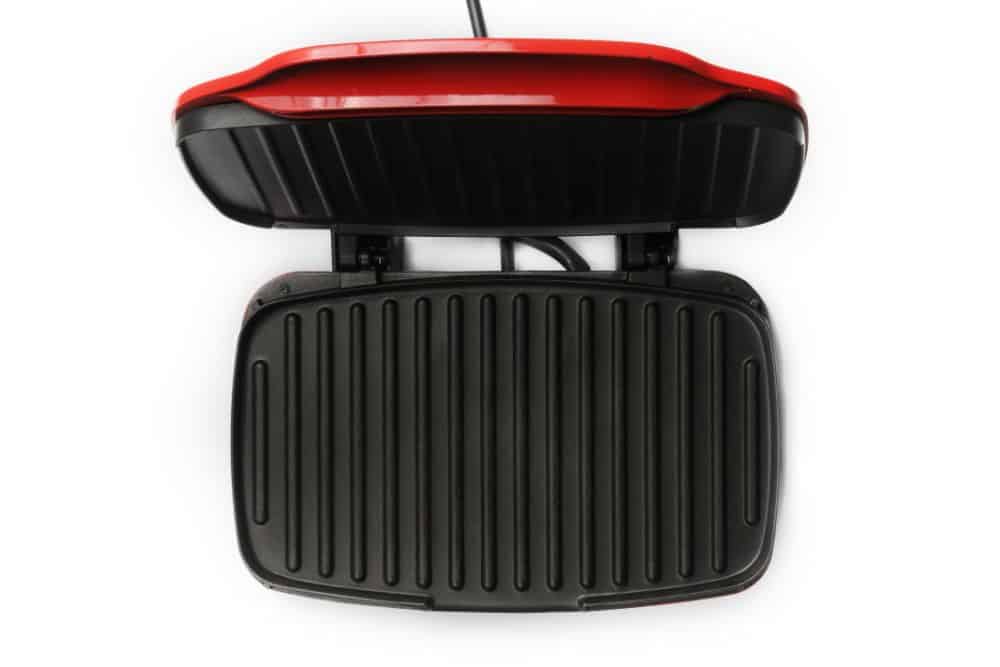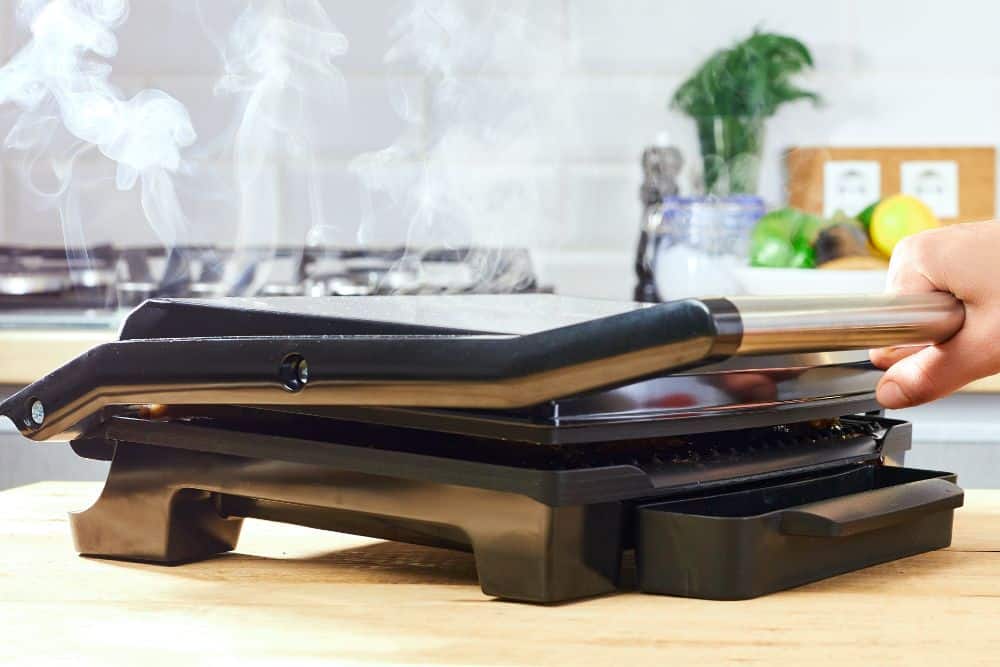Grilling is a popular way to cook meats and vegetables because it makes them taste phenomenal. In fact, 80% of American households own a grill or smoker, and many opt to use it for non-traditional meals, like breakfast or the Thanksgiving feast.
Grilling, in general, is also a healthy way to cook. It allows health-conscious eaters to avoid excess fats and calories from breadings and other coatings.
But is electric grilling healthy?
The short answer is yes.
There's a reason electric grills from George Foreman and Hamilton Beach are so popular. They're convenient and offer many of the same health benefits as other grill types. Of course, there are also a few areas where these easy-to-use appliances may fall short.

Read on to learn more about electric grilling, why it's healthy, and when you may want to avoid it.
Most cooks and nutritionists agree that electric grilling is a healthy way to cook food. Unlike frying or baking, grilling requires next-to-no extra fats. It also doesn't require breading or other coatings that add to food's caloric content.
When it comes to grilling, using an electric grill is arguably healthier than other methods. Unlike gas grills, propane grills, or charcoal grills, electric grills offer fewer carcinogens and promote even cooking. Plus, they're easier to incorporate into a health-conscious lifestyle. All of this makes electric grilling a healthy way to cook your grilled food.
Electric grill lovers like to point out that electric grilling helps avoid carcinogens. Some even claim that electric grilling is carcinogen-free. While that may not be entirely true -- all high heat cooking can cause carcinogens-- electric grills do avoid polycyclic aromatic hydrocarbons (PAHs).
PAHs are nasty carcinogens that occur when burning gas, coal, and wood. Essentially, where there's smoke, PAHs are probably there too. They're also in cigarettes, mothballs, and vehicle exhaust, which illustrates how detestable these particles are.
When meat's fat drips onto the charcoal grill's coals, the fat ignites, creating smoke. The smoke contains PAHs. As the smoke travels past the cooking meat, some PAHs may bind with the food. The same thing happens with gas and wood-burning grills.
Most scientists agree that PAHs cause cancer, especially in large amounts. So, regularly consuming meat cooked on gas or charcoal grills could lead to higher rates of certain cancers.
Electric grills don't create smoke like gas and charcoal or gas grills, so they don't create as many PAHs. Electric grills also tend to catch drippings in a tray rather than letting them reabsorb in meats. Removing drippings lowers the amount of PAHs in foods.
In fact, researchers have found that reducing smoke and lowering drippings can reduce PAHs by 41-89%! So, using an electric grill definitely reduces carcinogens in a way that gas and charcoal options can't.
Of course, the smoke from a charcoal grill arguably adds positive flavors to food. Critics of electric grills tend to point out that food cooked using electricity lacks the smoky flavor inherent to grilling. Luckily, there are ways to add the smoke flavor back in, and some of them won't increase PAHs in the food.
So, for the healthiest option, use an electric grill. Then, if desired, add the smoke flavor using a PAH-free method.
Electric grills heat up quickly and evenly. Cooks don't have to wait long for the grill to heat, and one side of the grill won't be colder than the other. So, the chicken thigh on the left side cooks at the same rate as the chicken thigh on the right side.

With gas and charcoal grills, that's not always the case. Meat on one side of a charcoal grill can come out underdone, while the meat on the other can end up overcooked. Though a hot side and colder side of a grill can have their advantages, it's easier to ensure meats cook all the way through when that's not the case.
Even cooking can help cooks, especially those new to the art of grilling, avoid foodborne illness, which affects millions of Americans each year.
Foodborne illnesses like E.Coli and Salmonella come from bacteria in undercooked meats. In mild cases, they can cause digestive upsets, including cramps, nausea, and vomiting. However, in some populations, like children and the elderly, a foodborne illness could be deadly.
An electric grill can help cooks ensure that their meats cook evenly. Amateur cooks, especially, can benefit from this feature. Quick, even heating means grilled meats are that much safer to eat.
Most nutritionists agree that grilling is a healthy cooking method. However, using a gas grill or charcoal grill can be a bit of a nuisance.
With charcoal grills, the griller has to purchase charcoal. Then they need to light it and let the charcoal heat. This process can easily add a half hour or more to the total cooking time. Plus, it can get messy. Charcoal isn't exactly white-shirt friendly.
Gas grills are usually large and have to sit outside because of their size as well as their stinky gas fumes.
An electric grill, though, can be conveniently small. There are large options, but there are also countertop appliances. They're smokeless, often easy to clean, and don't give off icky smells.
Because indoor grilling is more convenient, small electric grill owners are more likely to use it regularly. That means they're more likely to grill meat and veggies as part of a long-term healthy diet rather than a once-a-month grilling venture.
While electric grilling is a healthy cooking method, it doesn't come without some health risks. There are two possible health hazards that electric grill users should be aware of: heterocyclic amines (HCAs) and perfluorooctanoic acid (PFOA).
Heterocyclic amines are potent mutagens researchers have found in meat that cooks at high temperatures. These mutagens are associated with an increased risk of breast, colorectal, and prostate cancer.
HCAs form when high temperatures force amino acids, specifically creatine, to react negatively. Creatine is only in muscle meats, so HCAs aren't present when cooks grill vegetables or fruits. When grilling lamb, goat, beef, pork, chicken, or fish, though, HCAs are there.
Char marks, inherent to grilled meats, are a good indicator that HCAs are present. Unfortunately, there's no good way of avoiding char marks on an electric grill. In fact, char marks are a favorable sign that the food will taste good!
However, there are ways to reduce HCAs overall. There are also ways to counteract HCA effects using antioxidants.
1. Marinate meats in wine or beer. One study from the University of Porto in Portugal found that marinating beef in beer or red wine before grilling reduced HCAs by up to 90%.
2. Use garlic and or rosemary as a rub or marinade before grilling. Garlic, rosemary, and other spices can reduce HCA formation by up to 70%.
3. Consider pre-cooking meats in the oven. Less charring from the grill means fewer HCAs. Oven cooking with grill finishing is a popular restaurant method for steaks and other thick cuts, and it works just as well at home. (Keep in mind when choosing meats that processed meats may also contain cancer-causing chemicals).
4. When grilling, try to prevent too much charing by flipping meat frequently.
5. Remove visibly charred portions of meat before serving.
6. Consume grilled meat alongside lots of vegetables and fruits, which are high in antioxidants. High antioxidant foods may protect against cancer formation.
HCA formation is a problem with any type of grilling, including gas and charcoal grilling. PFOA, though, is only a problem for certain electric grills. So, when asking, "is electric grilling healthy?" PFOA always comes up.
PFOA is a chemical that manufacturers used to use in non-stick, non-reactive coatings, like Teflon. In 2019, over 180 countries agreed to ban it due to health concerns.
Scientists never believed PFOA was okay for human consumption, but manufacturers thought it burned off during manufacturing. So, many companies used it to make non-stick surfaces for electric grills, skillets, and other cookware.
Researchers later found that PFOA remained on many cookware products in trace amounts. The chemical is inert at lower temperatures, but when cooking at high heat, it can become reactive and acts as a health hazard.
PFOA is linked to chronic kidney disease, thyroid disorders, liver disease, testicular cancer, infertility, and low birth weight. So, it's something to avoid at all costs.
Luckily, the government asked non-stick coating manufacturers in the U.S. to stop using PFOA in their processes by 2015, and they did. So, electric grills and other non-stick cookware manufactured in recent years in the U.S. shouldn't contain it.
However, the Environmental Working Group (EWG) has raised the alarm about other chemicals similar to PFOA found in today's non-stick coatings. The EWG suggests avoiding all non-stick cookware as a precaution. Instead, they say to stick to cast iron and stainless steel cooking surfaces.
Though many electric grills feature convenient non-stick surfaces, some cast iron options are available. With the proper seasoning, cast iron cooking surfaces can become non-stick, making them just as convenient as other options.
Given how healthy electric grilling is overall, it makes sense to invest in one. When considering an electric grill, be sure to pay attention to the following:
Indoor grills tend to be small enough to fit on a countertop and work well when cooking for one or two people. Outdoor electric grills can be much larger, making food preparation for a bigger group easy. There are also portable electric grills that tend to be compact but work well for tailgating, camping, and other outdoor activities.
Choose a grill size that allows for frequent use to maximize its health-promoting potential.
Electric grills can have easy-to-clean, non-stick ceramic surfaces that heat up and cool down fast. Grills with surfaces like this are more convenient to use, so users often find grilling becomes part of their regular lifestyle.

However, non-stick coatings may have health hazards, and the grilling surface may not reach the highest possible temperatures, which some cooks prefer. Cast iron grills take longer to heat but avoid non-stick chemical coatings and can reach very high temps, allowing cooks to sear meat and veggies easily.
Finding an electric grill with a drip tray to catch PAH-causing drippings is a great idea if health is the goal.
It's also smart to consider a grill with a temperature gauge. Cooking meat at the right temperature reduces the risk of foodborne illness. Not all electric grills have a temperature gauge built-in. The ones that do are the best option.
